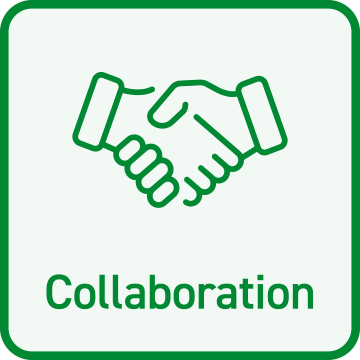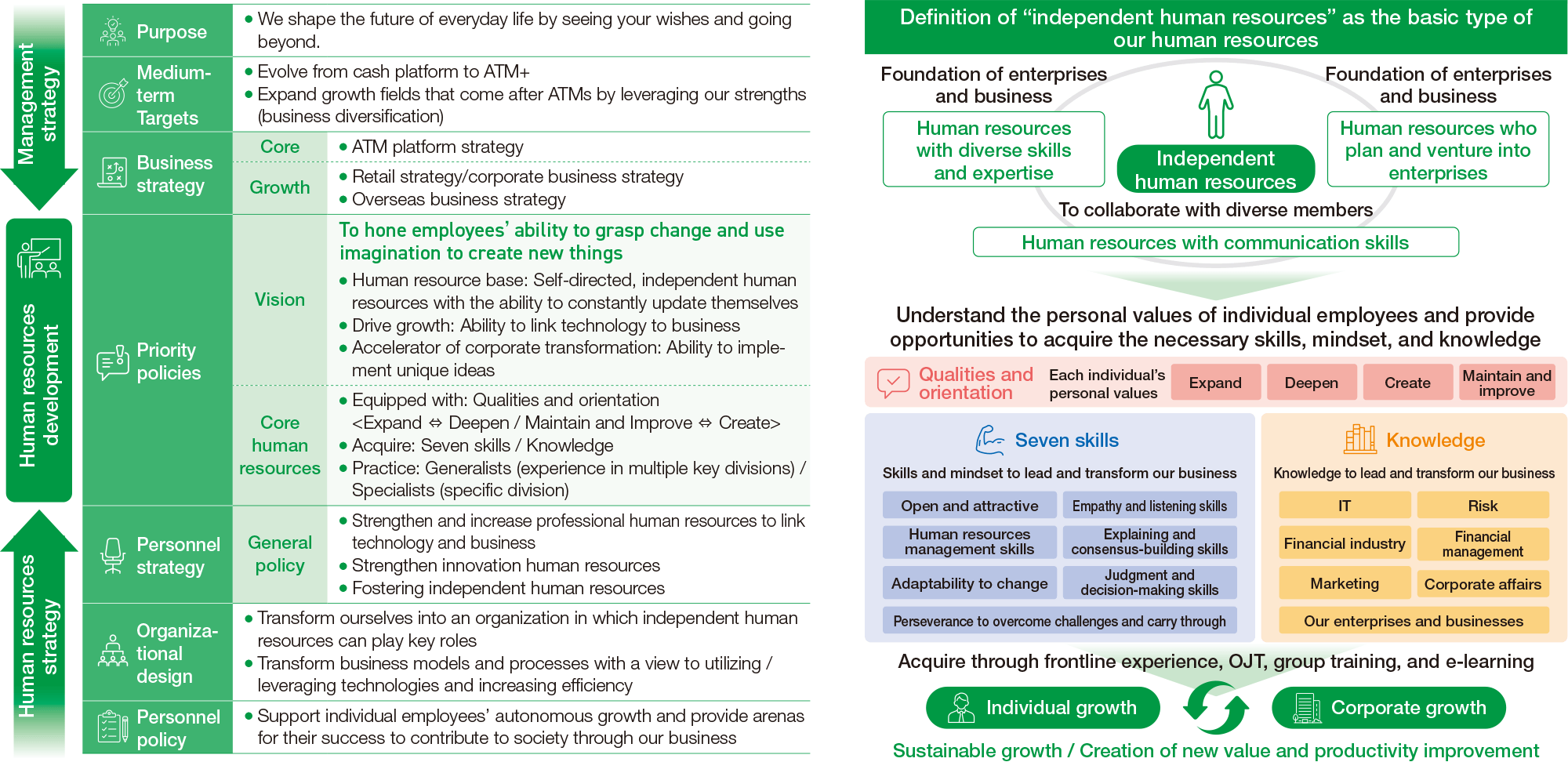
Social issues to be addressed
Now we live in the world where diversity is turned into strengths. In corporate management, to create a work environment suitable for diverse human resources and diverse work styles, as well as to develop every individual’s career and skills will be the key to strengthening competitiveness. In society, respecting different cultures and values and working together across differences in nationality, gender and religion will lead us to solutions to issues and further development.
Vision
Respecting human rights and diversity, the entire Seven Bank Group will strive to be a group of companies that help everyone to have a sense of purpose in life and satisfaction in work. We will expand our drive to also involve our business partners and partner companies to achieve a society where diversity can thrive.

Seven Bank's Major Initiatives
Respect Human Rights
The Code of Conduct, which is the ethical code followed by the Seven Bank Group, clearly expresses respect for human rights.
Additionally, we will make the Seven & i Group Human Rights Policy, established by the Seven & i Group, the foundation of our business activities. It will apply to all officers and employees. We will also continue encouraging all of the Seven Bank Group's business partners to support this policy, and work collaboratively to respect human rights.
Promote employees’ autonomous growth and voluntary career development
We support individual employees’ autonomous growth and provide arenas for their success to contribute to society through our business
Seven Bank’s human capital management aims to support the autonomous growth of “employees” who are to drive corporate value enhancement and provide them with arenas for success. This will enable all employees to contribute to society through business undertakings with a mindset geared to innovation, toward achieving the “future of everyday life” set forth in our Purpose. Regarding employees who are the driving force of human capital management, the Bank has declared “independent human resources” to be the ideal employees it seeks. Having clarified the definition of such human resources, it has set forth that providing opportunities for employees to acquire the necessary skills, mindset, and knowledge as a priority policy for its human resources development.

Identifying issues independently and seeking necessary solutions, to drive personal self-transformation and corporate transformation
To bring about a new corporate transformation in the times of rapid change, we need human resources who are not bound by conventional ideas and practices but are able to identify issues not yet visualized and use their own creativity and technology to transform themselves, the company, and society. “Independent human resources” are the basic type of human resources we seek, and on top of that, the ideal human resources we seek are to have the ability to lead growth and the ability to accelerate corporate transformation. We have introduced various measures to help every employee develop a mindset geared to innovation.

Improve employees’ well-being and engagement
Establish an environment that helps every employee to grow autonomously and an organizational culture that encourages employees to make ambitious tries freely to achieve our Purpose
Seven Bank has introduced the EX10 system which allows employees to allocate 10% of their work hours to activities for future contribution to the company or improvement of their skills, even without immediate benefit for their current work. Now incorporated in behavioral evaluations, it is intended to encourage self-directed innovation activities. As about 80% of our employees are mid-career hires, we aim to create an environment in which people with diverse backgrounds can play their roles successfully, and an organizational culture that helps them experience personal growth through new tries.

Fostering a corporate culture that embraces diversity and turns it into strength Contribute to the creation of a society that respects diverse human rights
We believe that it is our obligation to contribute to creating a society that helps diverse human resources to participate in success in diverse ways. We believe that creating an environment that helps everyone to participate in success will lead to prosperous life and the continuous development of society, which includes creating opportunities for people of all genders, ages, nationalities, and other backgrounds to participate in success, and developing diverse human resources. On the other hand, to encourage employees to contribute to Seven Bank for as long as possible, it is essential to establish and operate a system of evaluation that brings convincingness to employees and leads to a sense of their personal growth, as well as a compensation system that rewards the expected roles and achievements of individual employees. We believe that by building a system in which the Bank firmly supports employees drawing their own career paths and focusing on achieving them, we can encourage promising human resources to stay with us and contribute greatly to our business growth.
Concrete Initiatives in Support of Diverse Work Styles
・ Childcare leave, nursing care leave, and shorter work-hour system
・ Child activity leave system (5 days a year)
・ Volunteer activity leave system (5 days a year)
・ Introducing an employee stock ownership plan for managerial-level employees
・ Creating the expert career track
・ Establishing “special appointment positions” for highly specialized human resources
・ Introducing a management-by-objectives system and a bonus system for rehired retired employees
・ Developing systems and operations based on no age limit for working
 *1 Excluding officers, executive officers, employees seconded from the Bank to external companies, part-time employees and temporary staff; and including employees seconded from external companies to the Bank.
*1 Excluding officers, executive officers, employees seconded from the Bank to external companies, part-time employees and temporary staff; and including employees seconded from external companies to the Bank.*2 Ratio of female mangers is calculated based on management positions (Senior Officer, Officer, Assistant Officer), excluding those seconded from the Bank to external companies.
*3 Number of employees who took childcare leave in each fiscal year, including contractors
- Seven Bank’s Sustainability
- Top Message
- Sustainability Management
- ESG
- Environment
- Social
- Corporate Governance
- Materiality
- Materiality top
- Fundamental value
Offer a social infrastructure available anytime with safety and security - Social value
Realize a wide variety of services accessible to anyone, anywhere - Creation of new values
Create unique values beyond our customers’ expectations - Source of value creation
Create a society where everyone can be active - Value creation for the future
Contribute to the prosperity of our society and the future of the Earth
- Social Contribution Activities
- For Future Generations
- Social Contribution Activities
- Other Corporate Information
- Investor Relations
- Company
